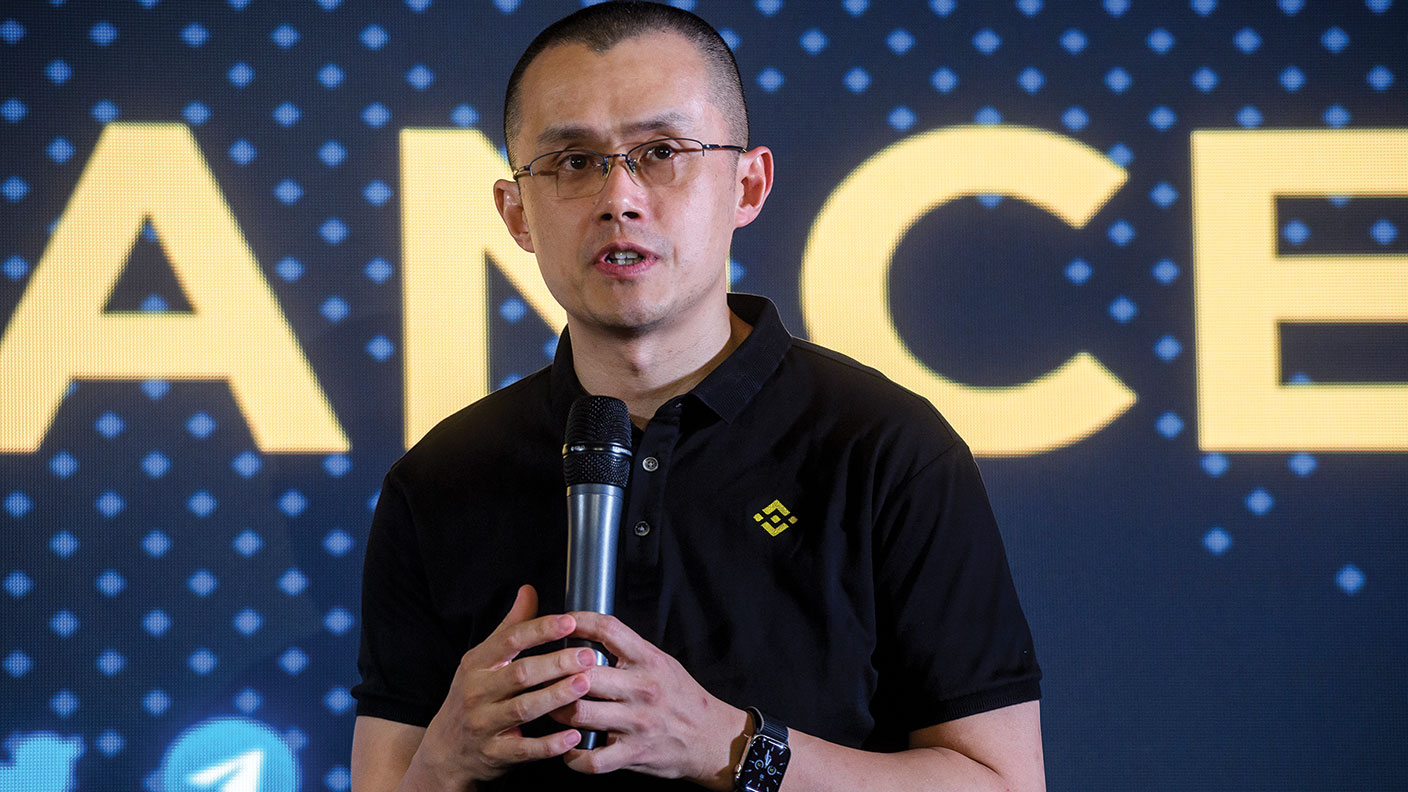Changpeng Zhao: Binance founder undaunted by the crypto winter
Changpeng Zhao, the founder of controversial cryptocurrency exchange Binance, has been severely battered by carnage in the sector. But the future is bright, he insists.


Get the latest financial news, insights and expert analysis from our award-winning MoneyWeek team, to help you understand what really matters when it comes to your finances.
You are now subscribed
Your newsletter sign-up was successful
Want to add more newsletters?

Twice daily
MoneyWeek
Get the latest financial news, insights and expert analysis from our award-winning MoneyWeek team, to help you understand what really matters when it comes to your finances.

Four times a week
Look After My Bills
Sign up to our free money-saving newsletter, filled with the latest news and expert advice to help you find the best tips and deals for managing your bills. Start saving today!
As cryptocurrencies plummet, Changpeng Zhao, Binance’s co-founder and chief executive, remains undaunted. He’s taking the cryptocurrency crash, which started with the collapse of the TerraUSD stablecoin, as an opportunity to “leverage to the max”, says Bloomberg. The cyptocurrency exchange is hiring and has a “healthy war chest” for expansion even as competitors go on the back foot.
Zhao’s firm rose to prominence during the boom in digital currencies across the last decade. Before the slump, it traded more of the popular bitcoin and ether currencies than its four largest competitors combined – $76bn worth each day, according to The Wall Street Journal – although not without generating a fair share of controversy along the way.
Thriving in the Wild West
Binance has drawn scrutiny from regulators for years, partly because the five-year-old firm “is everywhere and yet based nowhere”, says the Financial Times. It is incorporated in the Cayman Islands, yet has no headquarters and does business through a “constellation of affiliates” around the world.
MoneyWeek
Subscribe to MoneyWeek today and get your first six magazine issues absolutely FREE

Sign up to Money Morning
Don't miss the latest investment and personal finances news, market analysis, plus money-saving tips with our free twice-daily newsletter
Don't miss the latest investment and personal finances news, market analysis, plus money-saving tips with our free twice-daily newsletter
Among other issues, it has been accused of lax money-laundering controls that facilitate criminal transactions – a report by Reuters accused the company of processing $2.35bn in illicit funds over five years – and is banned by the UK regulator. The company denies wrongdoing and says that it is helping to drive standards in the industry higher: since 2021, users have been subject to more stringent identity checks.
However, it remains an obvious target for regulators who want to clamp down on what the FT calls “the porous border between the largely freewheeling crypto sector and the more tightly regulated conventional financial market”.
Success was a long time coming
Zhao seems to be pursuing a Silicon Valley-style strategy of putting market dominance ahead of profit and prudence. Despite what seems like a meteoric rise, his success was a long time coming, says Forbes. He was born in 1977 in China’s Jiangsu province. Shortly afterwards, his father was exiled for his “pro-bourgeois intellect” and in the 1980s the family moved to Canada.
Arriving in Vancouver at the age of 12, Zhao went on to major in computer science at McGill University in Montreal, then worked as an intern at a subcontractor for the Tokyo Stock Exchange, where he developed software for matching trade orders. After a stint at Bloomberg Tradebook, Zhao moved to Shanghai to start his first business venture, Fusion Systems, before launching a number of early cryptocurrency projects in 2013 and becoming chief technology officer of OKCoin.
In 2017, Zhao started Binance with OKCoin colleague Yi He.
Battling the headwinds
Binance was an immediate success. It raised nearly $15m in the “initial coin offering” for its own binance coin (BNB) currency – essentially a token that powers the platform’s operations – the same year it was founded. In its first eight months of operating, it rose to become the largest crypto exchange in the world by trading volume. Within six months it had three million users.
It was, however, soon struggling against headwinds – China banned cryptocurrencies that year and demanded the return of funds to investors. Binance complied, and in so doing earned the trust of traders. It quickly expanded worldwide. Following a recent funding round, its US arm alone was valued at $4.5bn, says Barron’s. Bloomberg estimates that Zhao was worth $95.8bn in 2021. His fortune collapsed to $10.2bn in the wake of the cryptocurrency meltdown (see below), but he remains the richest man in crypto.
Binance has also invested $200m in Forbes, looking to exploit the media platform to promote the blockchain and bolster its network. Zhao, it seems, won’t be leaving the spotlight any time soon.
Billionaires feel the pinch as the dream collapses
The craze for digital currencies turned a handful of tech evangelists into billionaires several times over, says Tom Maloney on Bloomberg. “But as quickly as they became the new faces of global wealth, they’re now seeing their fortunes vanish at an astonishing rate.” Changpeng Zhao led the crypto billionaire rankings and still does, despite losing 89% of the wealth he had amassed by November last year (see above).
The second biggest loser is Samuel Bankman-Fried, the CEO of crypto-trading platform FTX. His fortune is down 66% since it peaked at $26bn, which could spoil his plans of giving it all away to worthy causes. He has, for example, pledged $1bn to influence the 2024 US presidential election, says Greg Barker for UnHerd, seeking to heal the “bipartisan divide”. Whether funds from a billionaire running an “unregulated casino”will help is another matter.
Coinbase’s co-founders Brian Armstrong and Fred Ehrsam, once worth a combined $18.1bn, have seen their fortunes shrink to $2.1bn each as shares in their firm tumbled 79% since the initial public offering. That’s an “epic fail”, says Charles Gasparino in the New York Post, yet one that’s done little to humble the “voluble” Armstrong, who has grown rich off the back of the rise of dogecoin (created by Jackson Palmer and Billy Markus as a prank) and “other weird high-flying tulips”. Armstrong (pictured left) was forced into an 18% reduction in headcount, announced to workers via a text message sent at 8am.
Next on the list is Mike Novogratz, a former hedge-fund manager who made a comeback on the back of cryptos. His fortune has fallen to $2.1bn from $8.5bn in November, according to Bloomberg. He remains unfazed, says Coindesk, and is expecting “the next crypto cycle” to start later this year.
Finally, the notorious Winklevoss twins, Tyler and Cameron, “saw their fortunes sag to $3bn each”, from as high as $5.9bn apiece, says Bloomberg. The founders of crypto exchange Gemini, which announced this month that it would cut about 10% of its workforce, are currently touring with their rock band, Mars Junction. Appropriately, says Uproxx, the “much-mocked covers band” wows crowds with versions of Journey’s 1981 hit Don’t Stop Believin’.
SEE ALSO:
Celebrity bitcoin ads echo the subprime mortgage crisis
Get the latest financial news, insights and expert analysis from our award-winning MoneyWeek team, to help you understand what really matters when it comes to your finances.
Jasper is a former writer for the MoneyWeek and he wrote on an array of topics including travel, investing in crypto and bitcoin, as well as cars. Previous to that he freelanced at The Art Newspaper, PORT Magazine and The Spectator. Jasper is currently a freelance writer at FAD magazine and he has an English literature degree from the University of Exeter, and a Master's degree from UCL.
-
 Should you buy an active ETF?
Should you buy an active ETF?ETFs are often mischaracterised as passive products, but they can be a convenient way to add active management to your portfolio
-
 Power up your pension before 5 April – easy ways to save before the tax year end
Power up your pension before 5 April – easy ways to save before the tax year endWith the end of the tax year looming, pension savers currently have a window to review and maximise what’s going into their retirement funds – we look at how
-
 Halifax: House price slump continues as prices slide for the sixth consecutive month
Halifax: House price slump continues as prices slide for the sixth consecutive monthUK house prices fell again in September as buyers returned, but the slowdown was not as fast as anticipated, latest Halifax data shows. Where are house prices falling the most?
-
 Rents hit a record high - but is the opportunity for buy-to-let investors still strong?
Rents hit a record high - but is the opportunity for buy-to-let investors still strong?UK rent prices have hit a record high with the average hitting over £1,200 a month says Rightmove. Are there still opportunities in buy-to-let?
-
 Pension savers turn to gold investments
Pension savers turn to gold investmentsInvestors are racing to buy gold to protect their pensions from a stock market correction and high inflation, experts say
-
 Where to find the best returns from student accommodation
Where to find the best returns from student accommodationStudent accommodation can be a lucrative investment if you know where to look.
-
 The world’s best bargain stocks
The world’s best bargain stocksSearching for bargain stocks with Alec Cutler of the Orbis Global Balanced Fund, who tells Andrew Van Sickle which sectors are being overlooked.
-
 Revealed: the cheapest cities to own a home in Britain
Revealed: the cheapest cities to own a home in BritainNew research reveals the cheapest cities to own a home, taking account of mortgage payments, utility bills and council tax
-
 UK recession: How to protect your portfolio
UK recession: How to protect your portfolioAs the UK recession is confirmed, we look at ways to protect your wealth.
-
 Buy-to-let returns fall 59% amid higher mortgage rates
Buy-to-let returns fall 59% amid higher mortgage ratesBuy-to-let returns are slumping as the cost of borrowing spirals.
